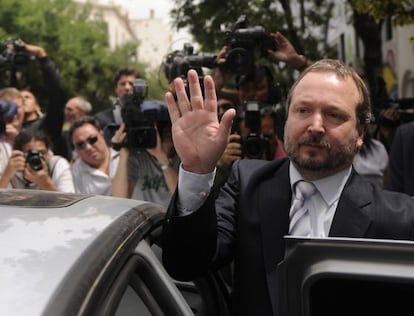Argentina's top court gives Clarín group more time to keep its holdings
Government wants to break media conglomerate's stronghold on sector

In a quick turnaround of events this past week, the Argentinean Supreme Court late Tuesday stopped the government from divesting the holdings of the country's largest media conglomerate Grupo Clarín on the same day that officials had launched the process.
Argentina's top court extended a preliminary injunction that had been revoked last Friday by a federal court judge, who gave the government of President Cristina Fernández de Kirchner the go-ahead to begin revoking some broadcast cable television licenses allotted to the Clarín group. Clarin's lawyers filed an appeal on Monday to stop the government's takeover.
Press freedom experts around the world are watching the developments in the Clarín case closely because they believe that the law was tailor-made to break up the powerful Grupo Clarín, which has been critical of Fernández de Kirchner's government.
Soon after the appeal was filed, government officials had appeared at Clarín's offices in Buenos Aires on Monday to formally notify its directors that they were about to begin the process of transferring and auctioning part of their holdings.
Press freedom experts believe the law was designed to break up Clarín
On Friday, Judge Horacio Alfonso of the Federal Civil and Commercial Court ruled that a 2009 media law passed by the government of President Cristina Fernández de Kirchner, which among other things seeks to break up media monopolies, does not violate Argentina's Constitution. It was a blow to the media giant, which earlier this month had gained some time when the court issued an injunction against the government until it could rule on Clarín's lawsuit against the government.
Now the Supreme Court has extended the injunction, overruling Judge Alonso's decision to lift the stay in his ruling which declared the media law constitutional.
Motherly outrage over acquittals

President Cristina Fernández de Kirchner is once again on a collision course with her country's judiciary after she announced that she will push for the "democratization" of Argentina's legal system.
She pledged to introduce reforms in a December 12 nationwide address, the day after controversial acquittals were handed down in a high-profile case involving a mother who has been seeking justice for her missing daughter, thought to have been sold into sex slavery.
"Very humbly, I say that it is time for each branch of government to take responsibility for things that take place. I pledge to push for a process to democratize our judicial system," the president said. "I am saying this because there are judges who set some people free so that they can commit more crimes, rape and murder. People in this country are tired of this."
Argentineans expressed their outrage on the night of December 11 when a three-judge panel in the southern city of San Miguel de Tucumán acquitted 13 people who had been charged with the kidnapping and disappearance of 23-year-old María de los Ángeles Verón, who was kidnapped on a street in broad daylight on April 3, 2002. Verón's mother, Susana Trimarco, has led a national campaign against the owners of brothels and alleged human traffickers who engage in sexual slavery. She even went underground, disguising herself as a prostitute and visiting numerous brothels in the Argentinean capital. It was there she found out that "Marita" had had a second child unbeknown to Trimarco, fathered by one of her captors.
There was a three-hour delay before the verdict was read, raising suspicions among Trimarco and her group of supporters that someone had convinced the judges to rule the other way. One of the defendants was the former wife of the owner of a local soccer team, Rubén Ale, who Trimarco believes runs a prostitution business in La Rioja province.
Under the law, media groups can only hold 24 cable television licenses and 10 radio and television broadcast licenses. The Clarín group owns 240 cable television companies, and holds 10 radio and four television licenses.
With Clarín's petition for a reconsideration and appeal before the federal court's appellate panel, Alfonso's order lifting the injunction becomes obsolete as a cautionary measure, said Damian Cassino, a lawyer for Grupo Clarín during a radio interview on Monday.
But Martín Sabbatella, the head of the Federal Authority of Audiovisual Communication Services (Afsca), refuted that interpretation when he notified Clarín that the process of divesting its holdings would begin immediately.
According to Sabbatella, the entire process will take 100 working days and be done in various stages. Following the official notification, which took place on Monday, the government is to appraise all the group's licenses and properties. Then Afsca officials will select which licenses will be turned over to the government for auction. The bidding process will then be held, and finally the awarding of the licenses to the new owners.
"They have every right to appeal and we know that they are appealing but that doesn't stop this process. The law is constitutional, and we believe that to stop this undertaking as a cautionary measure is a nonsense," Sabbatella said.
Meanwhile, in Hamburg, Germany, the International Tribunal for the Law of the Sea ordered the Ghanaian government to release the Argentinean vessel AMA Libertad, which it has been holding since having it impounded on October 3 on orders from a US federal judge in a debt dispute with investors who purchased bonds during the country's 2002 default.
Navy officials arrived in Accra on Wednesday to regain command of the 19th-century training vessel that has been docked in Tema.
Tu suscripción se está usando en otro dispositivo
¿Quieres añadir otro usuario a tu suscripción?
Si continúas leyendo en este dispositivo, no se podrá leer en el otro.
FlechaTu suscripción se está usando en otro dispositivo y solo puedes acceder a EL PAÍS desde un dispositivo a la vez.
Si quieres compartir tu cuenta, cambia tu suscripción a la modalidad Premium, así podrás añadir otro usuario. Cada uno accederá con su propia cuenta de email, lo que os permitirá personalizar vuestra experiencia en EL PAÍS.
¿Tienes una suscripción de empresa? Accede aquí para contratar más cuentas.
En el caso de no saber quién está usando tu cuenta, te recomendamos cambiar tu contraseña aquí.
Si decides continuar compartiendo tu cuenta, este mensaje se mostrará en tu dispositivo y en el de la otra persona que está usando tu cuenta de forma indefinida, afectando a tu experiencia de lectura. Puedes consultar aquí los términos y condiciones de la suscripción digital.








































